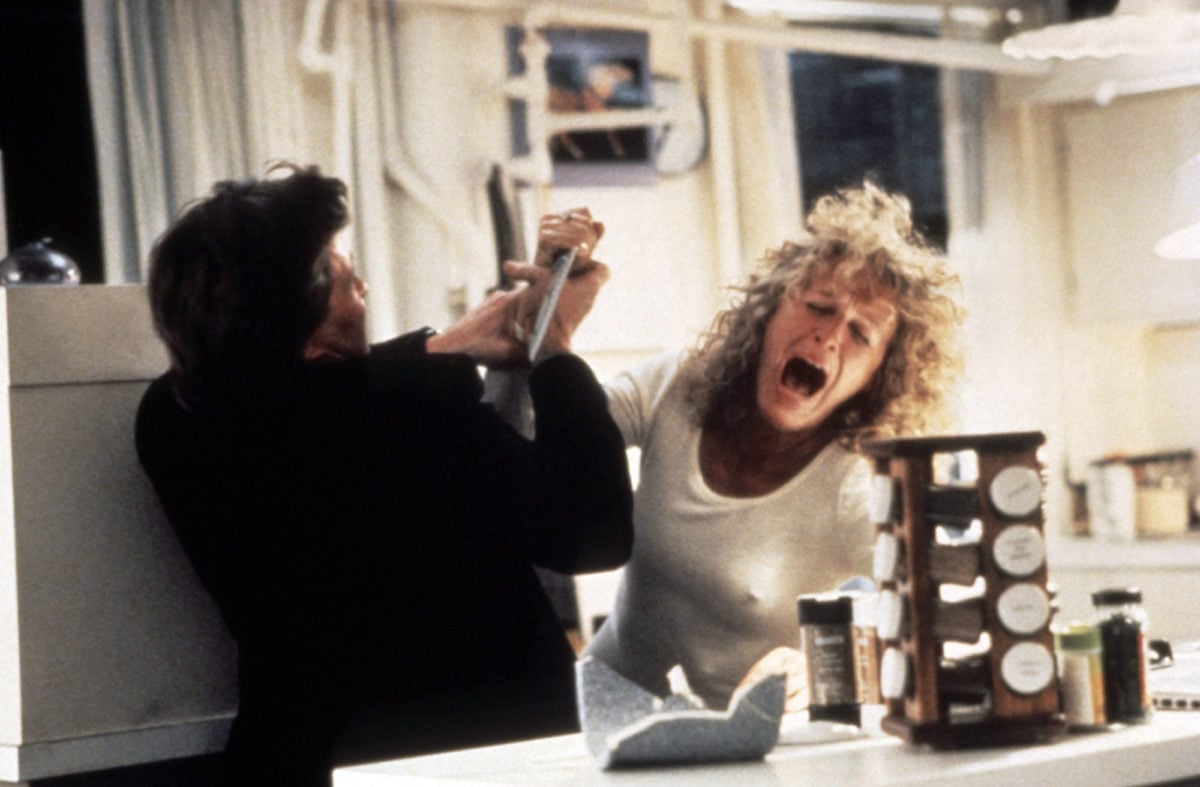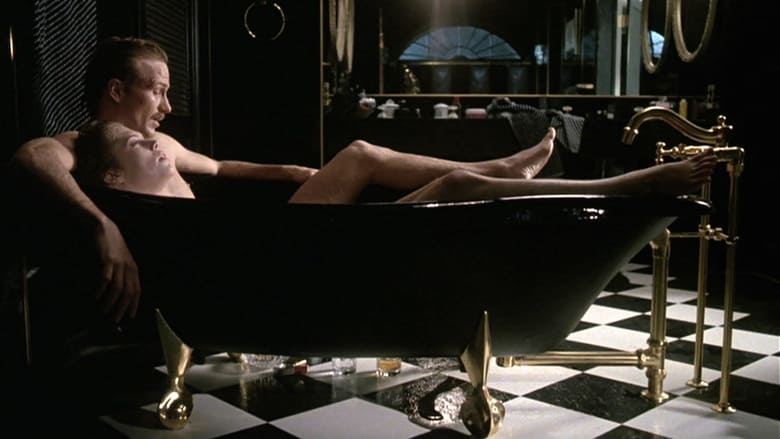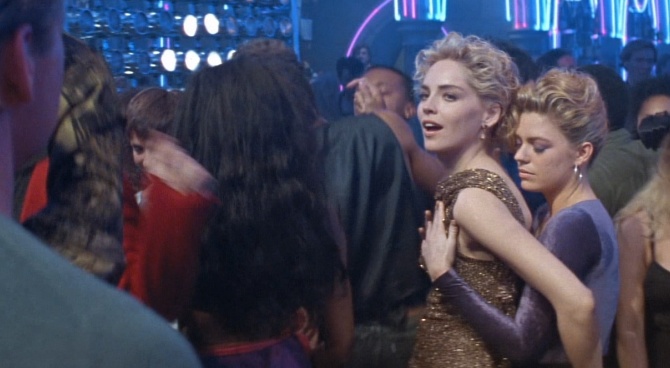As I look through the title quotes of the several highly rated IMDB reviews of the 1992 sexual thriller Basic Instinct I am immediately struck by phrases such as “thriller which achieves screen magic of the golden age”, “sleazy, amoral and worryingly entertaining”, “king of all erotic thrillers” and, my personal favourite, a title which simply reads “it’ll wear ya out”. Yet, on the other end of the spectrum I read reviews which throw words such as “dated”, “silly” and “muddled, illogical”. How can a film be considered such a sexual masterpiece and yet then also be dismissed as trash? I believe the reasoning is separate from the regular reasoning’s for a film to be critically split – I believe that the film’s divineness is down to its overly sexual nature. I am of the opinion that sex on film is one of the most divisive, if not THE most divisive element to a film’s release and critical acceptance. Whilst one can see sex on film as artistic and arousing, another can see it as amoral or pornographic and objectifying. The sudden craze of erotic thrillers throughout the 80s and into the early 90s led to an interesting change in sexual politics on film and created one of the most intriguing sub-genres of modern filmmaking.
 |
| credit |
What makes Body Heat so intensely interesting is the way it is not discussed enough as the groundbreaking foundation that it is. Without Body Heat, Verhoven’s Basic Instinct would be practically inconceivable. The film is also never acknowledged in regards to what it did to subvert and modernise the thriller and film noir genre. With Body Heat, Kasdan took Film Noir and sensationalised it with the inclusion of much profanity, graphic violence and overwhelming steamy sex scenes. The things that the directors of the 40s and 50s dreamed of putting in their film noirs were now a distinct consideration. Kasdan has previously commented also that his major influencers for the film were the film noirs of the late 40s and early 50s such as The Asphalt Jungle (1947) and Double Indemnity (1944) and that his intention was not to force in these sex scenes to modernise, but in fact to fulfil what the film noir directors that he idolised wanted their films to be. The film is often stated as being a pseudo-remake of Double Indemnity, primarily due to the several plot and character related parallels, significantly that the plot follows a scheming wife seducing a lawyer into murdering her husband before double crossing him in the third act. Released 37 years after its contemporary, the film is intensely sexual. In fact, star of the film Ted Danson’s mother went to see the film and walked out due to the picture’s provocative sexuality. According to the DVD commentary, she never told him this and pretended to have seen the film for many years after. The cast realised that they were undertaking something completely new by featuring such explicit sex scenes in the film and so, on the first day, in wanting the crew to feel comfortable during shooting, William Hurt and Kathleen Turner lined up the crew and both actors introduced themselves to each crew member. When they did this, however, both Turner and Hurt were completely naked.
The film is also interesting due to the timing of its release. After all, the film was released during a time before the 2003 US supreme court repeal of all sodomy laws including oral sex. The film is one of the first of a trend of overly sensationalised modernisations of classic noir films, a trend that carries on to this day with the early press rumours of a remake of Hitchcock’s Strangers on a Train to be made by the team of director David Fincher and writer Gillian Flynn (who had previously had major success with the rated R film Gone Girl). This was the start of something new in the film industry. What was once taboo now became the ultimate ticket sale booster. With the release of The Postman Always Rings Twice six months prior (another sexual thriller), the soon-to-be sub-genre had a storming start. The Postman Always Rings Twice is most notable for its on-the-kitchen sex scene between its stars Jessica Lange and Jack Nicholson. The scene was so realistic that many audiences believed that it was real and not simulated sex, a notion denied by the actors. When the scene was shot, the set was cleared for a more intimate feeling and the only people on set were Lange, Nicholson, Director Bob Rafelson and cinematographer Sven Nykvist.
 |
| credit |
In between 1981 and 1992 came an array of erotic thrillers, many of which were written by Basic Instinct writer Joe Ezterhaus, a man of notoriety on the Hollywood circuit due to his extensive drug and alcohol abuse and rumours of misogyny. A standout from the decade between Body Heat and Basic Instinct is the Adrian Lynne directed psycho-sexual thriller Fatal Attraction (1987), which stars Michael Douglas (though O.J. Simpson was at first considered for the role) being taunted by psychopath Glenn Close after a weekend love affair away from his wife leads to Close attacking him and hunting down the family. By this time, there was an eased atmosphere in regards to sex on film. Where the 70s had placed extensive violence onto our screens, the 80s had the task of sex. Due to the more comfortable nature in regards to nude scenes, Glenn Close said that in her opinion, she had no trouble shooting her nude scenes because she believed that they were not exploitative at all and that they all served the plot. The apartment used for Douglas’s flat toward the beginning of the film is in actuality the same apartment used for another highly sexual film of the 80s, directed by Adrian Lynne – “9½ Weeks” (1986), a film that became highly controversial due to its several scenes which feature low level BDSM-related sexual activities. After Fatal Attraction, Douglas became the poster boy for these erotic thrillers, going on to star in several, the most popular of which was of course his pairing with Sharon Stone in Basic Instinct. However, perhaps one can see that the end was coming for the sub-genre with a bizarre foreboding sign in 1988 when, during the film’s release in South Korea, Korean filmmakers released snakes and threw several smoke grenades into the theatre as a protest against the Hollywood film’s invasion of the Korean film industry. This led to censorship and hence the end was nigh, but not before the release of the sensational “king of erotic thrillers”, the “dated”, “silly” and “muddled, illogical” Basic Instinct.
 |
| credit |
Once the film had added its male lead, Michael Douglas, the script was changed drastically and Douglas’s questionable reasonings for starring the film went quickly under fire. The role of Nick Curran (Douglas’s character) was originally written as a lesbian cop and was written with Kathleen Turner in mind. Douglas’s stipulations began with two requests: 1) he declined to go fully nude in the film and 2) he wanted all references to his character being bisexual removed. However, I don’t feel as though this second choice was of a homophobic nature, as later in his career Douglas starred as the openly gay pianist Liberace and starred in several gay sex scenes with his co-star Matt Damon. It is also worth noting that no body doubles were used in any of the sex scenes; Verhoven was quoted as saying that it would lose the tension of the film.
Another key influence in the making of the film was the AIDS epidemic of the late 80s and early 90s, which led to the film garnering much controversy. Douglas said in interviews at the time that he wanted to star in the movie because he felt sex scenes were in danger of disappearing from Hollywood due to the epidemic. This bizarre martyr style cause led to several other questionable comments from Douglas in regards to the film. There was a considerable amount of controversy over the sex scene between Nick and Beth, which features the two in several compromising positions that, in some instances, look like Nick is forcing Beth into this. Some critics regarded it as rape, while others simply commented that he should have used a condom due to the AIDS epidemic at the time. The film was also strongly picketed by several gay rights activist groups. After a script leak, the activists were so against the portrayal of gay characters in the film that they blocked the San Francisco set on many occasions. Verhoven had to go to the extent of issuing fake call sheets to trick the protesters into blocking unused locations. *SPOILER ALERT UPCOMING* When the movie was released, the activists paraded the movie theatres handing out flyers that simply read “Catherine did it”, completely ruining the twist ending of the film. The riots got to such a point that the San Francisco police were reported to have deployed 50 riot police to every location that screened the film every day to deal with the picketing LGBT activists. This didn’t seem to have any impact at all, however, as the movie opened #1 on that same weekend and went on to become one of the highest grossing movies of that year.
 |
| credit |
Despite all of the dubious morals in 2002, Ezterhaus apologised in a New York Times article for glamorizing smoking in the film. Not the objectification, not the stereotypes, not the possible critiques of misogyny, but the glamorization of smoking. And Verhoven? What did he regret? Well, Verhoven was on record when he first signed on to do the film as saying that he wanted to make the first mainstream Hollywood film with an erect penis. I can only suppose from the lack of erect penises in the film, that his only regret is that his wish did not come true.
-Thomas Carruthers


0 Comments